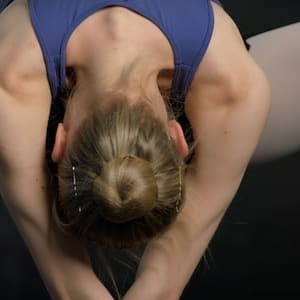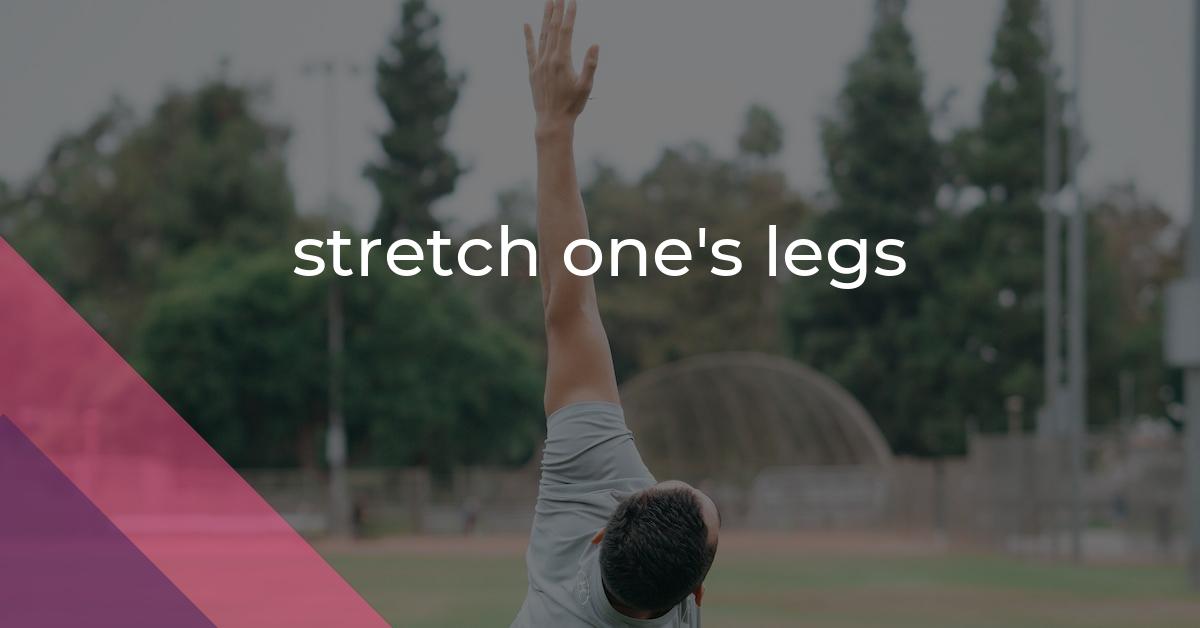stretch one’s legs: Idiom Meaning and Origin
What does ‘stretch one's legs’ mean?
The idiom "stretch one's legs" means to take a break from sitting or being in a confined space by standing up, walking around, or doing some physical activity to relieve stiffness or restlessness.

Idiom Explorer
An idiom that refers to taking a break or having a period of rest from work or other responsibilities.
The idiom "take a walk" means to leave a place or situation, usually as a way to calm down or clear one's mind.
The idiom "stretch the truth" means to exaggerate or distort the facts to make a story or statement more interesting or favorable.
The idiom "stick one's neck out" means to take a risk or put oneself in a vulnerable position by expressing an opinion or taking action that goes against the norm or common consensus.
The idiom "step out" means to leave a familiar or comfortable situation to try something new or take a risk. It can refer to physical actions or a change in behavior or attitude.
The idiom *spread one's wings* means to gain independence or freedom from restrictions, often by exploring new opportunities or trying new experiences.
The idiom "spin one's wheels" means to exert a lot of effort or energy without making any progress or achieving any result.
The idiom "snap out of" means to abruptly stop behaving or thinking in a certain way, typically in order to improve one's mood or attitude.
Expanding Mobility
The idiom "stretch one's legs" has been used in the English language since the early 16th century. It is a phrase commonly used to mean taking a short walk or getting some exercise after a period of sitting or inactivity. The origin of this idiom is not known for certain, but it likely comes from a literal interpretation of the phrase, referring to the physical act of stretching one's legs to alleviate stiffness or restlessness.
This idiom has been found in various sources, including literary works, historical records, and everyday speech. It is widely accepted and recognized in different English-speaking cultures, particularly in the United States. The fact that it has remained popular and relevant over time speaks to its continued importance.
Stretching one's legs goes beyond its literal meaning. In addition to the physical act of moving around, it also implies a need for mental or emotional rejuvenation. It suggests a desire for change, a break from routine, or an opportunity to explore something new. By stretching one's legs, individuals seek a temporary escape from a confined or restricted environment, whether physical or psychological.
Within the American cultural context, this idiom embodies the spirit of exploration, adventure, and the pursuit of freedom. It encompasses the idea of taking action and breaking free from constraints, as well as the belief in the restorative power of movement and fresh perspectives. Americans resonate with this idiom as they navigate their fast-paced lives and strive for personal and professional growth.
Furthermore, this idiom can be used in a figurative sense to describe situations where individuals are given more freedom or independence. For example, if an employee is given more responsibilities at work, it can be said that they are stretching their legs in their role. This usage highlights the potential for personal development and achievement.
While "stretch one's legs" has a well-established meaning and usage, it's important to note that idioms can evolve over time. Their interpretations may vary across different linguistic communities or change according to contemporary cultural shifts. The flexibility of idiomatic language allows for creative interpretation and expression, opening up possibilities for individual understanding and application.
In addition to "stretch one's legs," there are several related idioms that can be explored. One such idiom is "put one's feet up." This idiom means to relax and take a break, often by reclining and resting one's feet. It is similar to "stretch one's legs" in that it suggests a desire for rest and rejuvenation. However, "put one's feet up" emphasizes relaxation rather than physical movement.
Another related idiom is "kick up one's heels." This idiom means to celebrate or enjoy oneself, often by engaging in lively or exuberant activity. While it shares the theme of movement with "stretch one's legs," "kick up one's heels" emphasizes a more carefree and energetic approach to enjoyment.
A third related idiom is "out on one's feet." This idiom means to be extremely tired or exhausted, often to the point of feeling physically or mentally drained. It is the opposite of the desired state conveyed by "stretch one's legs," as it suggests a need for rest and recuperation.
Lastly, "take a walk" is another related idiom. This idiom means to go for a walk, often as a means of relaxation, exercise, or reflection. It shares the theme of physical movement with "stretch one's legs" but does not convey the same sense of restlessness or desire for change.
"stretch one's legs" is an idiom that originated in the physical act of taking a short walk or getting exercise. However, its meaning has expanded to encompass broader themes of exploration, rejuvenation, and the pursuit of freedom. The idiom's popularity and usage in American culture reflect its enduring relevance. While its basic meaning remains consistent, the context and interpretation of the idiom may evolve over time, continuing to enrich the English language with its depth and versatility.
Example usage
Examples of how the idiom "stretch one's legs" can be used in a sentence:
- After sitting in the car for hours, he decided to pull over and stretch his legs.
- During the long flight, passengers were advised to get up and stretch their legs to avoid discomfort.
- After studying for several hours straight, she took a break to stretch her legs and clear her mind.
More "Activities" idioms



